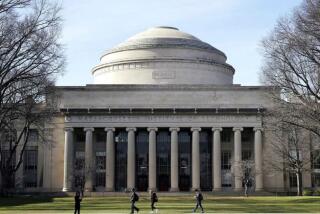SCIENCE / STUDENTS NEEDED : Concerns Add Up as Few Graduates in U.S. Study Math
- Share via
The Bureau of Labor Statistics projects that from 1995 to the end of the century, eight of the 10 fastest growing professions will be in science-based occupations. But the number of American college graduates majoring in mathematics, a fundamental component of other scientific disciplines, as well as the number of graduates proceeding to advanced degrees, has declined from a peak reached in 1970 and has barely recovered from a low point in the early 1980s.
“Fewer and fewer college students are getting degrees in science, and many of those who do are so poorly trained in mathematics that they are not being accepted by competitive graduate schools,” said Charles D. Hollister, marine geologist and vice president of the Woods Hole Oceanographic Institution (Woods Hole, Mass.) at a recent Senate hearing on math and science education. “It is simply not possible to do science without knowing mathematics,” he testified before the Senate Committee on Labor and Human Resources. “For the record, you cannot do any kind of real science without speaking its language, and the language of science is mathematics.”
At the same time, the percentage of doctorates awarded in the United States to foreign students--the majority visiting students on temporary visas, more than half of whom promptly return to their country of origin with their advanced training--has risen sharply. Those with permanent visas are likely to stay in the United States.
The growing proportion of foreign graduate students in mathematics and other math-related sciences creates “an unstable situation,” said James A. Voytuk, project director for a recent National Research Council report on the prospects for the mathematical sciences in higher education into the next century. “About half of the foreign Ph.D.s end up staying in this country, mostly in teaching positions,” he said in an interview. “But if external situations change, such as the emergence of a real Common Market in Europe after 1992, more of those individuals would return home--leaving teaching shortages here.”
More to Read
Sign up for Essential California
The most important California stories and recommendations in your inbox every morning.
You may occasionally receive promotional content from the Los Angeles Times.













